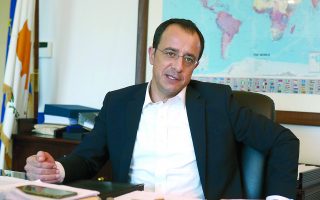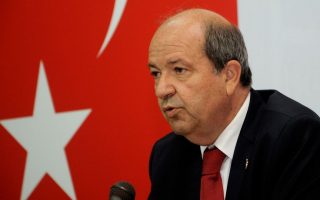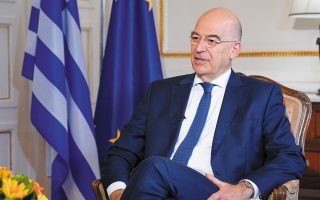Together for the Balkans of the 21st century
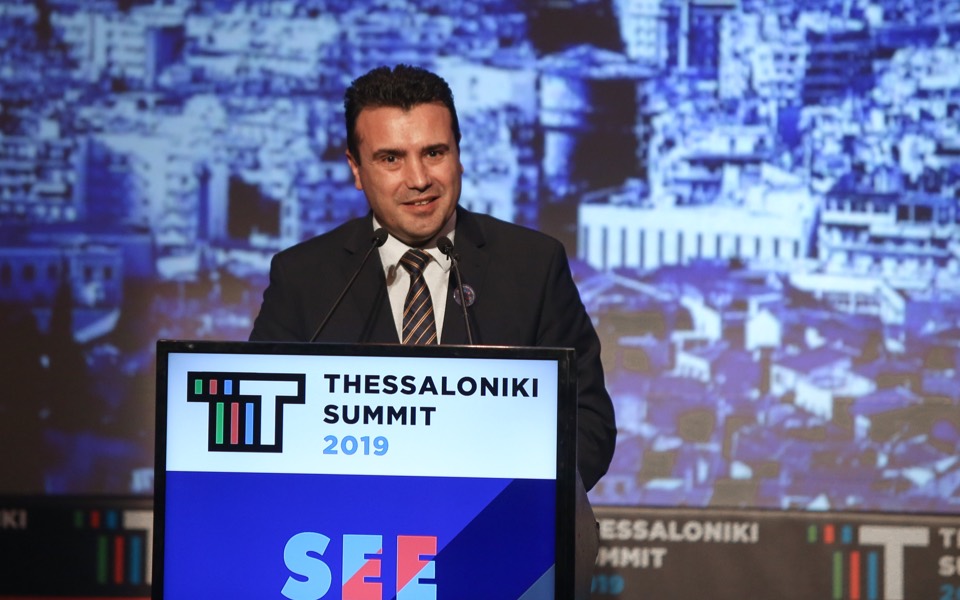
The vastly beneficial impact of the Prespes accord on North Macedonia and the wider region is discussed by the country’s Prime Minister Zoran Zaev in this interview with Kathimerini in which the pro-Western leader argues that the strengthening of bilateral ties with Greece has forged a multifaceted pole of stability in the area spanning politics, the economy and energy.
Zaev underscores the importance of having fighter jets from NATO ally Greece patrol North Macedonia’s airspace as a “huge” gesture that will “further strengthen our security.”
He stresses that the two states are committed to fully implementing the bilateral obligations stemming from the 2018 agreement, while emphasizing that close friendship and cooperation between Athens and Skopje will help usher in “the Balkans of the 21st century, in which the past, the shadows of history, will not hinder us as insurmountable obstacles to our common European future.”
Looking back on the developments that led to the name deal, Zaev says that Greece’s former prime minister “Alexis Tsipras and I entered a process in which we risked our political careers without calculations for our personal future.”
Speaking of Prime Minister Kyriakos Mitsotakis, he says that their relationship has been “relieved of all previous issues that burdened the relations between our two countries,” while voicing his satisfaction over the latter’s pledge that “Greece remains a strong lobbyist and supporter of [North Macedonia] in the upcoming negotiation process with the European Union.”
Zaev will visit Athens this week to meet with the president and the prime minister. He will also address the Delphi Economic Forum on May 14.
How did the effort that led to the Prespes agreement begin and come to fruition?
Looking back, three years later, I can say that in both my country and in Greece, the strong political will of the leaders and their closest associates to change the image of the Balkans has connected. I think I would not be wrong, nor sound immodest, to say that both Alexis Tsipras and I entered a process in which we risked our political careers without calculations for our personal future. We accepted the challenge of giving the world a solution resulting from a European approach in seeking answers to the most difficult questions, with the dispute related to my country’s name and the three-decade-long blockade being such a question. We reached an agreement towards finding a solution. And we knew that there was a way out, otherwise there would not have been such political and personal will of all those involved in the process. Of course, the highly esteemed, experienced mediator Matthew Nimetz was here, and, with his wisdom and experience, he knew when to take part in the process, but more importantly, when to let us walk through the maze towards the solution by ourselves. Such a complex and sensitive problem requires delicacy, vigilance and responsibility at every moment. That is how we acted.
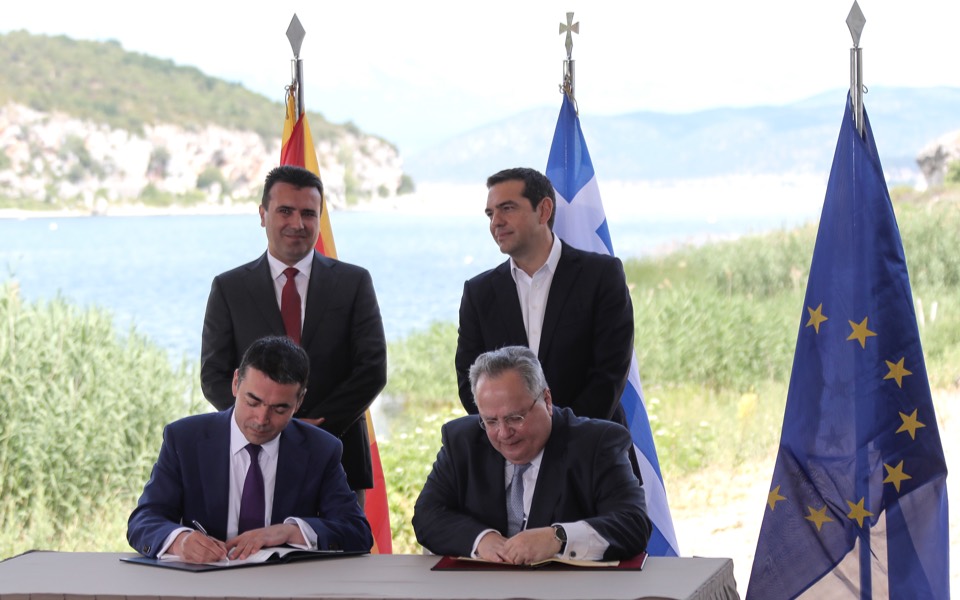
How did you work to that end with then Greek premier Alexis Tsipras?
This was not a matter of bulldozer diplomacy as some thought or suggested. The most important moment was when we saw in each other values that we share, values that are common to us. Then the connection became more visible, and, more importantly, it became motivating for both of us. We chose to make decisions. To resolve the name issue of my country. To not procrastinate, to not calculate, to not play with the public in both our countries, to not waste the time of our friends, supporters of the process. To give the region a new Balkans, the Balkans of the 21st century, in which the past, the shadows of history, will not hinder us as insurmountable obstacles to our common European future. That was what connected us, and that connection was strengthened by the friendly atmosphere that became increasingly friendly at each of our meetings, or at the working meetings of our closest associates and the ministers of foreign affairs, Nikola Dimitrov and Nikos Kotzias.
In such an environment we reached the solution that we crowned with the Prespes agreement, which in a friendly way established the interpretations of the term “Macedonia,” while protecting the dignity and national, cultural and overall identity of our people in a dignified way. The whole democratic world, all our mutual friends, partners and supporters said that this agreement is the step that took us out of the blockades and the past and opened the gates to the future – the future that has provided us with NATO membership, and the future that has led us to the recommendation for an unconditional start to EU membership negotiations.
Is there still opposition to the deal inside North Macedonia?
I consider that, three years later, all the arguments of opposition actors who misled the public in the Republic of North Macedonia turned out to be extremely unfounded and malicious, such as that the Prespes agreement degrades the acquired rights and deprives future generations of the right to be Macedonians. These were false and harmful manipulations, since Article 7 of the agreement makes a clear distinction that the term Macedonia and Macedonian in Greece means the Hellenic part of the history, while Macedonia and Macedonian in our context reflects our territory, language and people with all attributes, with its history, culture and heritage different from those in Greece. There are still certain political centers, mainly in the nationalist part of the political spectrum in our country, which, from time to time, shows a public inclination to challenge the Prespes agreement, but I assure you that these are activities without any serious impact.
Do you feel vindicated by the result?
I have absolutely no doubt about the results we achieved with the Prespes agreement and the far-reaching benefits of it for our country. The open issue that Greece had with our constitutional name arose from the independence of the Republic of Macedonia and was an obstacle for our country’s accession to the United Nations and for its full international recognition and establishment. This dispute was the reason for the blockade obstructing us from achieving our strategic goals for EU and NATO membership. The dispute was the stone that was dragging the Republic of Macedonia down.
We are our own selves on our own, and that is finally recognized by all our neighbors, by the Hellenic Republic and the international community. We have confirmed and strengthened the ethnic and cultural Macedonian identity of the citizens of the Republic of North Macedonia once and for all. With the agreement, we have removed the last obstacle to our NATO membership and become the 30th member of the Alliance. Our gain is priceless, since NATO membership guarantees our sovereignty, security, stability and a prosperous future of our citizens. We have also unlocked the start of the EU accession negotiation process and are now expecting the first intergovernmental session with Brussels to mark the beginning of the accession negotiation in chapters.
How do you assess your cooperation with the present prime minister, Kyriakos Mitsotakis, and what are the prospects for bilateral relations?
We had our first meeting with Prime Minister Mitsotakis at the UN General Assembly in New York in 2019, and then at the “Southeast Europe: Promoting Regional Cooperation and Reform” Summit in November 2019. At those meetings, and at our consequent meetings, we established a friendly relationship relieved of all previous issues that burdened the relations between our two countries. We accepted the established partnership based on trust and friendship, which transformed relations between the two countries into an alliance, confirmed by our country’s membership of NATO. My colleague Mitsotakis unequivocally confirmed to me that Greece remains a strong lobbyist and supporter of our country in the upcoming negotiation process with the European Union. We are both committed to the full and unimpeded implementation of the obligations of both parties set out in the Prespes agreement. At all our meetings we discuss greater economic cooperation, with the view that this cooperation should continue and should be upgraded by including the region in EU policies for the economic recovery of European countries during the pandemic and in the post-Covid period.
Will the close cooperation between our countries act as a factor of stability in the Balkans?
The Prespes agreement was a breakthrough on an international level for North Macedonia and the implementation of our goal for NATO membership and building partnerships with all our neighbors. Greece’s gesture of accepting to patrol our skies, as our NATO ally, and further strengthen our security, is huge. Until Prespes, we were neighbors who always had a third party at the table, whereas nowadays we are allies and members of the powerful NATO family and the most powerful military alliance in the world. Our country, together with Greece and Bulgaria, Albania and Montenegro, as member countries of the Alliance, is a factor of stability in the region, as it is an exporter of security. North Macedonia’s membership of NATO has redefined our role in the international security arena and enabled us to actively participate in a wide range of collective defense security missions, together with Greece. And with that we have cemented the foundations for the prosperity of both our countries.
How important is the gas pipeline that will connect our two countries?
It is another link that will strengthen our friendships and cooperation in the field of energy. The signed memorandums of understanding for the implementation of the projects, the Alexandroupoli Liquefied Natural Gas Terminal, the provision of natural gas, the Alexandroupoli gas-fueled power plant, as well as the Interconnection Agreement for gas connection with Greece, create an opportunity for a permanent and stable natural gas supply to the country, from where it will be distributed to the wider region.
This will help us achieve our green scenario, the most acceptable for the development of the country, which should provide economic and environmental benefits.
We expect this to significantly improve and advance cooperation at the regional level. By linking up with the countries of the Western Balkans, North Macedonia will become a transit route for natural gas and an energy hub in the Balkans. The gas connection projects with Greece are the first of this kind in Southeast Europe.
By connecting with Greece, instead of having only one source of gas in our country, now the possibility is open for supply from several different sources, such as gas from the United States, the Middle East and others, which means a safe and secure supply of natural gas from different suppliers, and a diversification of sources that will make our country energy independent.
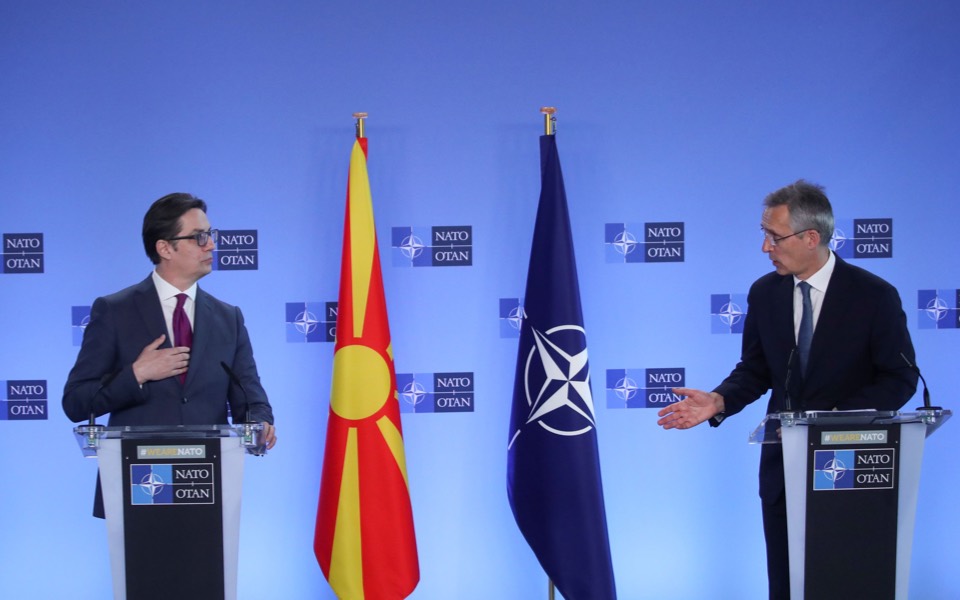
What does it mean to you to be a full member of NATO?
On March 27, we celebrated the first anniversary of our NATO membership, through which we implemented one of our most important national strategic goals, set by a unanimous decision of the Parliament in 1993. NATO membership is a sovereign expression of our choice to be part of the Euro-Atlantic community of democracies, a commitment that has always had strong public support and enjoyed a broad supra-party and interethnic consensus. NATO membership is the greatest contribution to our security and stability. It is the strongest guarantee for protection of the territorial integrity and sovereignty of the Republic of North Macedonia.
We are now sitting at a table with the largest and most developed countries in the world. Of NATO’s 30 members, 21 are members of the EU. We are an equal part of this great family of developed democracies. Together with them, we make our contribution to world peace and security. By participating in NATO missions and supporting other Alliance activities, we contribute to reducing the risks and threats that could potentially bring instability to our region or to North Macedonia. We are a small country with limited resources, but, in alliance with all NATO member-states, it will be much easier to deal with geopolitical challenges. We share democratic values with our allies, and NATO membership helps us in preserving, developing and promoting those values at home. NATO membership is an additional motive for strengthening social cohesion in North Macedonia, and serves toward strengthening the resilience of our democracy.
Are you optimistic about your country’s accession to the EU?
The last report of the European Parliament Committee on Foreign Affairs in March confirmed the crystal-clear file of North Macedonia and the unconditional recommendation of the European Commission 2020 report for the start of the country’s negotiations with the EU. This government has managed to put the country back on the path of security and safety and has made significant progress in key political and economic areas, recognized by all our strategic partners. We became the 30th member of NATO and received a unanimous, unconditional decision from the EU Council to start accession negotiations.
Unfortunately, at the end of last year, as a result of one member-state not giving its consent for approving the negotiation framework, the first Intergovernmental Conference for the official start of accession negotiations did not take place. We have the Treaty of Friendship, Good-neighborliness and Cooperation with Bulgaria, but despite that they vetoed the path of our European integration, for which the EU institutions and member-states, including Bulgaria, have repeatedly confirmed that we fully meet the conditions. In the 21st century, it is not European to write the history of another nation, as we need to build a future together. For North Macedonia, for the Macedonian people and for all citizens of our country, any intervention on the Macedonian identity is not acceptable.
We have been in the process for a long time, we do not want to stop and we will not stop, but not at the cost of our dignity and our identity. We believe that we will find common solutions with Bulgaria and build a quality future for us and for future generations. We should not forget the past, but we should build bridges of cooperation between all countries in the Balkans, as that is the only path leading to success. We should be proud of the successes of each country in the Balkans and move forward together. North Macedonia continues to make every possible political and diplomatic effort to address the reasons for the derailment of its EU accession process, reforms will not stop or slow down and we are now focused on the most important issues for providing European standards at home.

